Alfred Hitchcock
-
“I’m Scared of Everything”: Alfred Hitchcock’s BBC Interview About Psycho, 1960
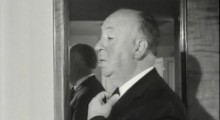
In this fairly typical Hitchcock interview from 1960, the director adjusts his tie and sits down for a brisk promotional session for Psycho, describing the plot with typical drollery and running through some of his greatest soundbite hits: the oft-told story about how he was imprisoned briefly as a child at his father’s request, qualifying his statement that actors should be treated like cattle (“You mean you want to make them larger cattle than they are?”), and whether he’s ever wanted to be an actor himself (“Nothing so low as that”).
by Filmmaker Staff on Feb 9, 2015 -
Watch: Alfred Hitchcock’s Visual Gallery
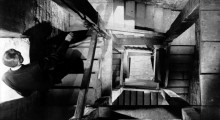
Here is a rather comprehensive look at the visual motifs apparent throughout the formative years of Alfred Hitchcock’s illustrious career, from 1934’s The Man Who Knew Too Much to 1976’s Family Plot. Whether staging action around a staircase or riffing on the illusion of free fall, Hitchcock revisited and realigned techniques from one decade to the next. This compilation from Steven Benedict breaks down the visual grammar of 42 of the filmmaker’s features, stitching together his preferred still images with his swooping camera techniques, including a personal favorite: Gregory Peck’s POV as he drinks a glass of milk in Spellbound.
by Sarah Salovaara on Jan 5, 2015 -
Watch: The Eyes of Hitchcock by :: kogonada
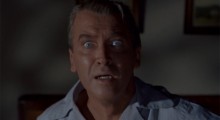
Here’s the latest from video essayist :: kogonada, who Scott Macaulay interviewed earlier this week. Beginning, as you might expect, with the zoom into red eyes from Vertigo‘s opening credits and the zoom out from Janet Leigh’s dead eyes in Psycho, :: kogonada captures Hitchcock’s characters’ eyes in states of fear, hypnosis, dawning comprehension et al. This one’s via the Criterion Collection.
by Vadim Rizov on Sep 26, 2014 -
Steven Soderbergh Mashes Up the Hitchcock and Gus Van Sant Versions of Psycho
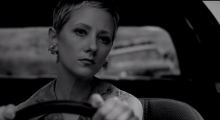
This is kinda brilliant: a mashup by Steven Soderbergh of Hitchcock’s original Psycho and (now rendered in black and white) Gus Van Sant’s shot-for-shot remake from 1998. Soderbergh is retired from feature filmmaking, but his Cinemax miniseries The Knick is coming soon and, well, this is presumably something he just threw together in his spare time to stave off boredom!
by Nick Dawson on Feb 25, 2014 -
The Watergate Theory of Screenwriting
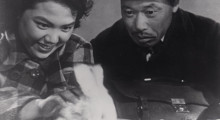
At the 2013 Screenwriting Research Network International Conference, Larry Gross discusses narrative, knowledge and Kurosawa’s Ikiru. I want to begin by expressing my sense of unworthiness at being offered the chance to give this keynote address, given the stature of some of those who proceeded me in performing the task, and I want to express briefly my personal admiration for three of these predecessors. Here in Madison, Wisconsin, I don’t have to explain the importance of David Bordwell as one of the world’s greatest film scholars. I only want to mention that I first became aware of his work in […]
by Larry Gross on Oct 21, 2013 -
Lady Vengeance: The Bride Wore Black Review
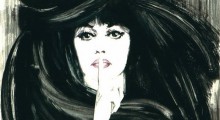
Loaded with recognizable tropes just begging to be tampered with, genre film is fertile spoof material, as can be evidence by obvious examples like the pointless Scary Movie franchise, or even within the same film as in those slasher film that knowingly straddle the line between terror and comedy, or B-Movies so tongue-in-cheek campy they function both as a good-humored critique of the genres the are playing against as well as a standalone narratives in their own right. Francois Truffaut’s sometimes goofy, sometimes chilling 1969 film The Bride Wore Black is genre lampoonery in the hands of a French auteur, […]
by Farihah Zaman on Nov 14, 2011 -
The Perfect Swan
(Editor’s Note: This essay contains spoilers.) In literature or in oratory, where rhetoric arose from, it’s somewhat difficult to separate the argument’s mode of persuasion from its substance. In order to make an entirely skilled rhetorical point, the writer or speaker will have to present a series of assumptions and assertions, facts and hypotheses, in such a way that makes the argument’s substance apparent. That’s why literature lends itself to the intellectual: it’s founded upon a progression of ideas. Cinema is often referred to as a different kind of linguistic medium (the “language of film”), but a linguistic one nevertheless, […]
by Zachary Wigon on Dec 10, 2010 -
Tom Tykwer, The International
CLIVE OWEN AND NAOMI WATTS IN DIRECTOR TOM TYKWER’S THE INTERNATIONAL. COURTESY COLUMBIA PICTURES. German writer-director Tom Tykwer, arguably one of the most exciting auteurs in world cinema, has been immersed in movies since he was a child and always seemed destined to become a director. Born in the town of Wuppertal in 1965, by the age of 11 Tykwer had picked up a Super 8 camera and begun making films. At the age of 14, he got a job at Cinema, the local arthouse theater, where he would stay after hours, repeatedly watching Blade Runner. After completing his compulsory […]
by Nick Dawson on Feb 13, 2009 -
Kurt Kuenne, Dear Zachary: A Letter To A Son About His Father
DIRECTOR KURT KUENNE WITH ZACHARY BAGBY IN KUENNE’S DEAR ZACHARY: A LETTER TO A SON ABOUT HIS FATHER. COURTESY OSCILLOSCOPE PICTURES & MSNBC FILMS. Since he was a boy, making films has been at the very center of Kurt Kuenne’s life. He fell in love with the movies as a kid growing up in Silicon Valley in Southern California, and already at the age of seven began trying to emulate his heroes by shooting films on Super 8 and then later VHS cameras, using friends and family as actors. Kuenne studied film at USC’s prestigious School of Cinema-Television (where he […]
by Nick Dawson on Oct 31, 2008
